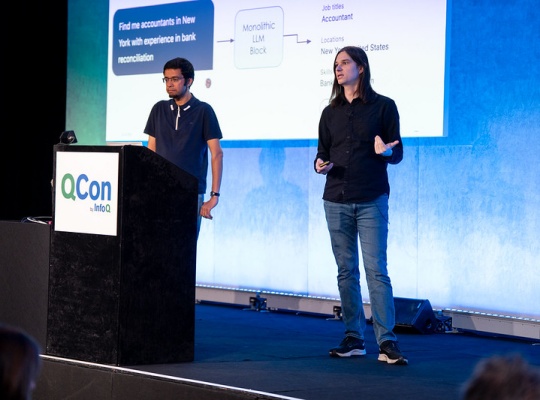Codetown
Codetown ::: a software developer's community
GatorLUG - Linux User Group
Event Details
Time: October 17, 2012 from 6pm to 7:45pm
Location: The Lab
City/Town: Gainesville
Website or Map: http://gatorlug.org
Event Type: meeting
Organized By: Clint Collins
Latest Activity: Oct 16, 2012
Event Description
Greetings All,
You are invited to join us at the next GatorLUG meeting in "Innovation Central" Gainesville, Florida.
The Laboratory is closing at the end of this month. So, this will be the last month we will be able to enjoy the hospitality that Larry extended to us in this venue. My sincere thanks to Larry for allowing us to take over your entire space on the third Wednesday of the month and for all the great food and drinks.
Meetings are always free and open to the general public.
More information about the current meeting with a map link:
http://www.gatorlug.org/node/331
More information about GatorLUG: http://www.gatorlug.org/node/10
----------------------------------------------------------------------------
GatorLUG Meeting Agenda for October 17, 2012
6:00 - 6:30 Announcements / General Discussion
6:30 - 7:45 Highly Available Apache for the Masses | Martin Smith, Dan Stoner
(Attempts at) Highly Available, Fault Tolerant, Distributed Apache for the Masses
The Apache HTTP Server, commonly referred to as Apache, is a web server software notable for playing a key role in the initial growth of the World Wide Web. [1] Apache httpd has been the most popular web server on the Internet since April 1996, and celebrated its 17th birthday as a project this February. [2]
The Apache HTTP Server Project is an effort to develop and maintain an open-source HTTP server for modern operating systems including UNIX and Windows NT. The goal of this project is to provide a secure, efficient and extensible server that provides HTTP services in sync with the current HTTP standards.
Martin Smith and Dan Stoner are members of the Linux team at the UF Computing & Networking Services' Open Systems Group. They will be presenting an evolution of designs for highly available, fault tolerant, and distributed Apache servers for bulk hosting customers.
[1] http://en.wikipedia.org/wiki/Apache_HTTP_Server
7:45 - 8:00 Open discussion, meet and greet someone new
See you there,
Clinton Collins, President
GatorLUG, Gainesville, Florida
Notes
Welcome to Codetown!
 Codetown is a social network. It's got blogs, forums, groups, personal pages and more! You might think of Codetown as a funky camper van with lots of compartments for your stuff and a great multimedia system, too! Best of all, Codetown has room for all of your friends.
Codetown is a social network. It's got blogs, forums, groups, personal pages and more! You might think of Codetown as a funky camper van with lots of compartments for your stuff and a great multimedia system, too! Best of all, Codetown has room for all of your friends.
Created by Michael Levin Dec 18, 2008 at 6:56pm. Last updated by Michael Levin May 4, 2018.
Looking for Jobs or Staff?
Check out the Codetown Jobs group.
InfoQ Reading List
Things Software Developers Think They Don’t Need to Care about, But Can Impact Their Job

Holly Cummins gave a keynote at Goto Copenhagen where she urged developers to care about overlooked issues that shape their work. She warned of unintended consequences of design decisions, promoted systems thinking and statistical literacy, stressed mastering concurrency as hardware evolves beyond Moore’s Law, and mentioned the impact of AI on the job market.
By Ben LindersBun Introduces Built-in Database Clients and Zero-Config Frontend Development

Bun 1.3 revolutionizes full-stack JavaScript development with unified database APIs and zero-config frontend setup. Experience enhanced performance with built-in Redis support and optimized bundling. With a focus on community feedback, Bun is poised to outpace Node.js and Deno, delivering faster, efficient, all-in-one capabilities for modern developers.
By Daniel CurtisAPI Platform Unkey Ditches Serverless After Performance Struggles

Developer Platform Unkey has written about rebuilding its entire API authentication service from the ground up, moving from serverless Cloudflare Workers to stateful Go servers after re-evaluating the constraints of their serverless architecture. The move resulted in a sixfold performance improvement and eliminated the workarounds that had become a dominant part of its engineering efforts.
By Matt SaundersPresentation: Lessons Learned From Building LinkedIn’s First Agent: Hiring Assistant

Karthik Ramgopal and Daniel Hewlett discuss the evolution of AI at LinkedIn, from simple prompt chains to a sophisticated distributed agent platform. They explain the transition to a supervisor-sub-agent model that enables parallel development and modular quality evaluation. and share a blueprint for building resilient, high-scale agentic systems.
By Karthik Ramgopal, Daniel HewlettKubernetes 1.35 Released with In-Place Pod Resize and AI-Optimized Scheduling

The Cloud Native Computing Foundation (CNCF) announced the release of Kubernetes 1.35, named "Timbernetes", emphasizing its focus on mutability and the optimization of high-performance AI/ML workloads.
By Mostafa Radwan
© 2026 Created by Michael Levin.
Powered by
![]()
RSVP for GatorLUG - Linux User Group to add comments!
Join Codetown